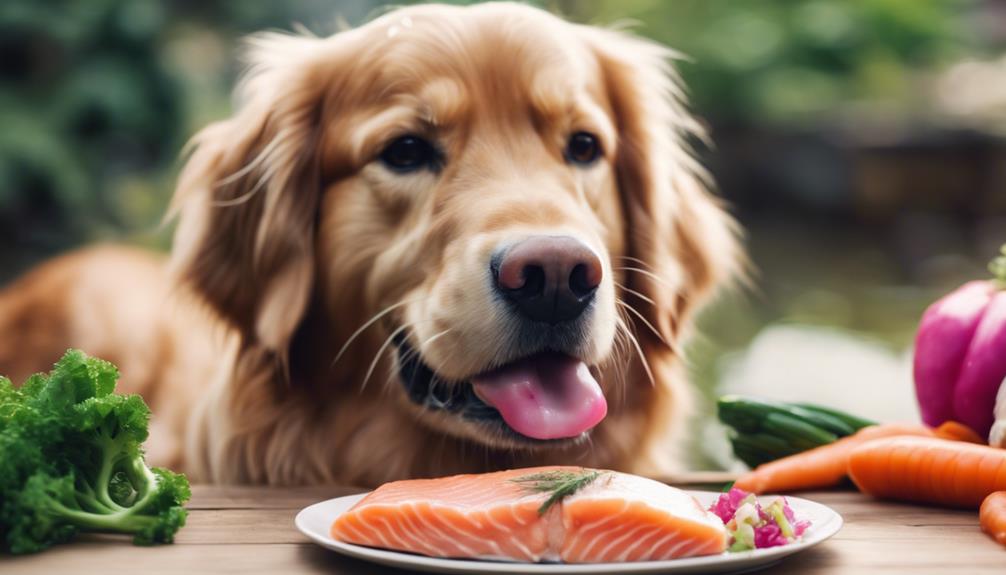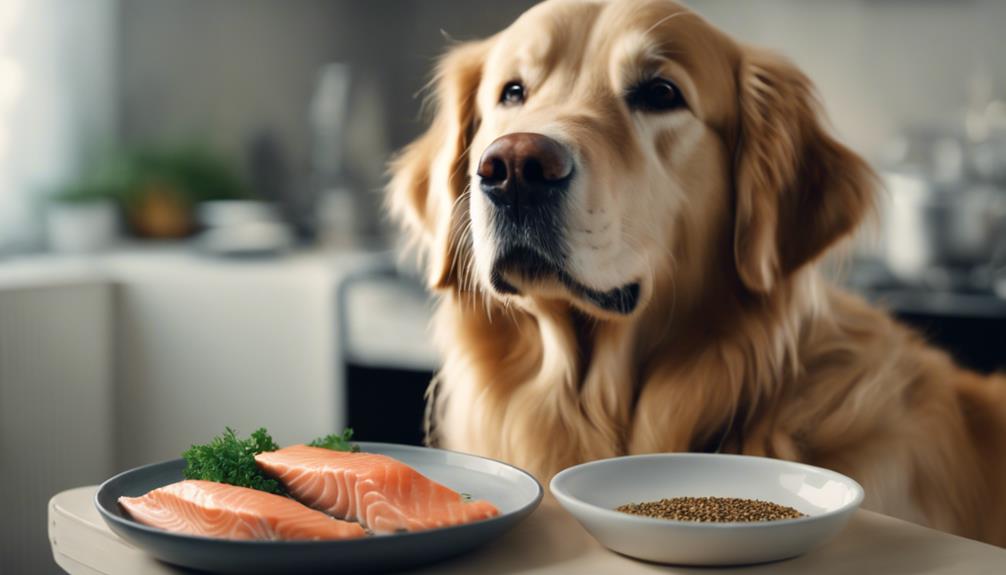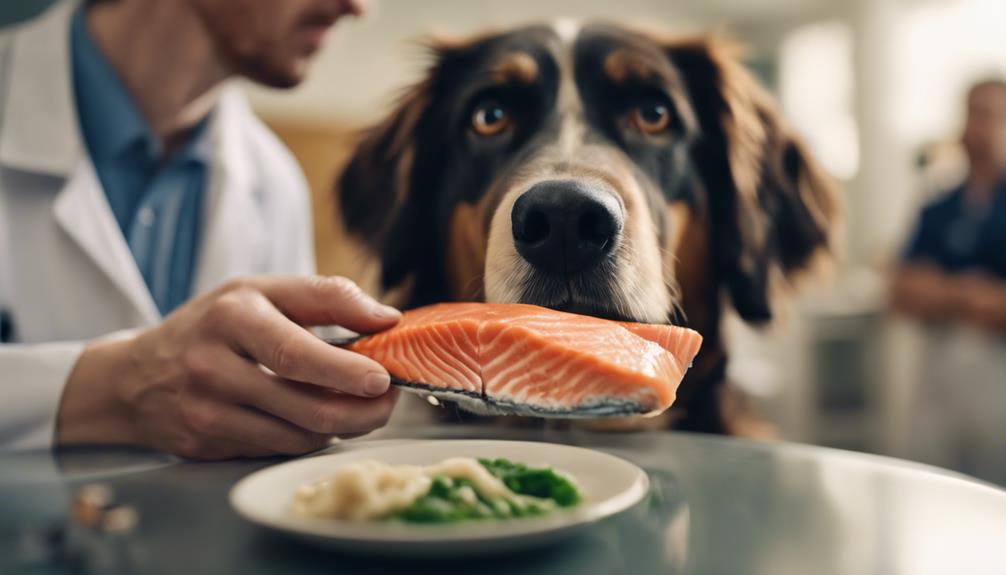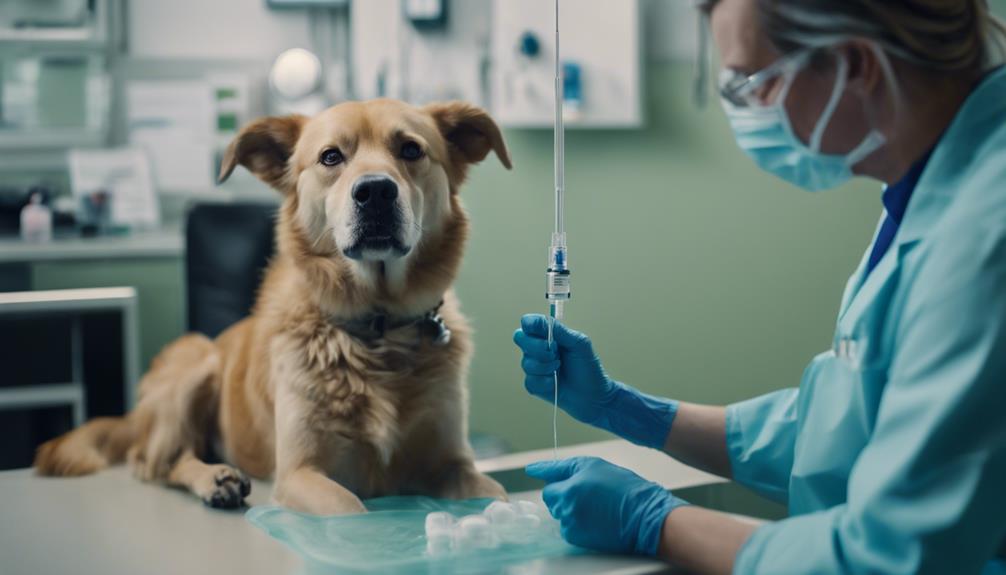Exploring the suitability of salmon in a canine diet unveils a realm of considerations that pet owners must navigate with prudence. As the inquisitive minds pondering over the compatibility of this fish with dogs' nutritional needs await informed insights, a pet nutrition expert's perspective can shed light on the intricacies involved.
From optimal consumption levels to potential health risks and the nuances of preparation, the discourse surrounding dogs and salmon is a multifaceted one that demands a careful examination. The interplay of benefits and concerns warrants a closer look to decipher the most judicious approach in incorporating this seafood staple into a dog's diet.
Key Takeaways
- Salmon can be added to a dog's diet in moderation to provide essential fatty acids.
- Consult a vet before feeding salmon to determine if it suits your dog's needs.
- Avoid raw or undercooked salmon to prevent salmon poisoning disease.
- Choose high-quality salmon from cold water marine environments and cook it thoroughly.
Nutritional Consideration for Dogs
Dogs, being omnivores akin to humans, can safely consume various meats, including fish like salmon, under careful nutritional considerations to maintain a balanced diet. While dogs require a complete and balanced diet typically provided by commercial pet foods, adding salmon should be approached cautiously to preserve this equilibrium.
Small amounts of salmon are not toxic to dogs; however, they should not replace the dog's regular diet entirely. It is essential to monitor the quantity of salmon given to ensure it does not upset the nutritional balance. Consulting a veterinarian for guidance on incorporating salmon into a dog's diet is advisable to address any specific dietary needs and prevent overfeeding or potential health risks associated with improper consumption.
Feeding Guidelines for Salmon
When incorporating salmon as a dietary supplement for dogs, it is crucial to adhere to the 10 percent rule of the dog's total daily calories. This guideline helps maintain a balanced diet and prevents overfeeding.
Calculating the caloric requirements for dogs can be done similarly to humans, utilizing tools like the USDA National Nutrient Database. It's essential to introduce salmon in moderation to avoid any potential gastrointestinal issues or nutrient imbalances.
Nutritional Benefits of Salmon

Incorporating salmon into a dog's diet can provide various nutritional benefits, particularly due to its content of essential fatty acids offering anti-inflammatory properties beneficial for the dog's skin health. Salmon is rich in omega-3 fatty acids, specifically EPA and DHA, which can help improve skin and coat condition, reduce inflammation, and support overall joint health in dogs.
These fatty acids play a crucial role in maintaining healthy cell function and promoting a strong immune system. Additionally, salmon is a good source of high-quality protein, vitamins D and B12, and minerals like selenium, all of which contribute to the overall well-being of dogs.
Supplementing a dog's diet with salmon can be a nutritious addition when done in moderation and as part of a balanced diet.
Health Risks of Salmon for Dogs
Salmon poses potential health risks for dogs, necessitating caution in its inclusion in their diet. While salmon can offer nutritional benefits, it may not be suitable for all dogs. Some dogs may not require the extra fatty acids or vitamin D found in salmon, and adding it to their diet without consideration can lead to health issues.
Raw or undercooked salmon should be avoided due to the risk of salmon poisoning disease, which can be severe if not promptly treated. Consulting a veterinarian to determine your dog's specific dietary needs before introducing salmon is crucial. Ensuring proper cooking and portion control, as well as monitoring for any adverse reactions, are essential steps in safely incorporating salmon into a dog's diet.
Choosing and Preparing Salmon for Dogs

To ensure the safe incorporation of salmon into a dog's diet, proper selection and preparation methods play a crucial role in maintaining the nutritional balance necessary for their well-being. When choosing and preparing salmon for dogs:
- Opt for salmon sourced from northern or southern latitudes for optimal fatty acid content.
- Fresh, canned, or frozen salmon from cold water marine environments is suitable.
- Cook salmon thoroughly to an internal temperature of 145 degrees Fahrenheit, and remove the skin before serving to reduce the intake of fat and calories. Simple cooking methods like poaching, steaming, or broiling without added oils, salts, or seasonings are recommended.
Salmon as a Dietary Supplement
When considering salmon as a dietary supplement for dogs, it is essential to prioritize their nutritional needs and overall well-being.
While dogs can benefit from the nutrients in salmon, it should complement their existing diet rather than replace it entirely. Salmon can provide essential fatty acids that promote healthy skin and coat.
When incorporating salmon into a dog's diet, it is crucial to follow feeding guidelines, ensuring it constitutes no more than 10 percent of the dog's total daily caloric intake. Moderation is key to prevent overfeeding and maintain a balanced diet.
Consulting a veterinarian before adding salmon can help determine if it is suitable for your dog's specific dietary requirements and avoid any potential health risks associated with overconsumption.
Caloric Requirements for Dogs

Considering the dietary needs of dogs, understanding their caloric requirements is crucial for maintaining their overall health and well-being. To ensure dogs receive the appropriate amount of calories, the following points should be considered:
- Individual Factors: Factors such as age, size, activity level, and overall health play a significant role in determining a dog's caloric needs.
- Caloric Calculation: Caloric requirements for dogs can vary widely, but a general guideline is to provide 30 calories per pound of body weight per day. However, consulting a veterinarian for a more tailored approach is recommended.
- Balanced Diet: It's essential to balance a dog's diet with the right amount of protein, fats, carbohydrates, vitamins, and minerals to meet their caloric needs while promoting overall health.
Moderation in Feeding Salmon
Maintaining moderation in incorporating salmon into a dog's diet is essential to prevent nutritional imbalances and ensure the overall well-being of the animal. While salmon offers valuable nutrients, excessive consumption can lead to issues such as weight gain, digestive problems, or even toxicity from contaminants like mercury.
Following the 10 percent rule of the dog's total daily caloric intake is crucial when adding salmon as a dietary supplement. This approach helps prevent overfeeding and allows for a balanced diet. By exercising caution and feeding salmon in appropriate portions, pet owners can harness the benefits of this fish while safeguarding their dog's health.
Essential Fatty Acids in Salmon

Salmon is rich in essential fatty acids that offer valuable benefits for dogs' overall health and well-being. These fatty acids play a crucial role in maintaining a dog's skin, coat, and cognitive function.
Here are three key benefits of essential fatty acids in salmon for dogs:
- Anti-Inflammatory Properties: The omega-3 fatty acids in salmon can help reduce inflammation, making it beneficial for dogs with skin conditions like dryness or allergies.
- Improved Joint Health: Essential fatty acids support joint health in dogs, potentially reducing inflammation and promoting mobility, especially in older or arthritic dogs.
- Enhanced Cognitive Function: The omega-3 fatty acids in salmon are essential for brain health, aiding in cognitive function and overall mental well-being in dogs.
Omega-3 Supplements for Dogs
When enhancing a dog's diet with additional omega-3 fatty acids, consider incorporating specialized supplements designed to support their overall health and well-being. Omega-3 supplements for dogs are formulated to provide the essential fatty acids found in fish like salmon, offering benefits such as anti-inflammatory properties that can aid in improving skin health and overall well-being.
These supplements can be particularly useful for dogs that may not consume enough fatty acids through their regular diet or those with specific health conditions that may benefit from the additional nutrients. Omega-3 supplements offer a convenient and controlled way to ensure your dog receives the necessary nutrients without the need to introduce salmon or other fish into their diet.
Consultation With a Vet

Seeking guidance from a veterinary professional is crucial when considering dietary changes or supplements for your dog's health and well-being. It is essential to consult with a vet before introducing salmon into your dog's diet to ensure it aligns with their specific nutritional requirements. A vet can provide personalized recommendations based on factors such as your dog's age, breed, weight, and overall health status. Additionally, they can advise on the appropriate amount of salmon to incorporate and any potential risks or contraindications to be aware of. Prioritizing a consultation with a vet can help safeguard your dog's health and prevent any adverse reactions or complications that may arise from dietary changes.
- Assess your dog's individual nutritional needs.
- Discuss the appropriate amount and frequency of salmon intake.
- Seek advice on monitoring your dog's response to the dietary changes.
Avoiding Raw or Undercooked Salmon
To ensure the safety and well-being of your dog, it is imperative to thoroughly cook any salmon intended for their consumption. Raw or undercooked salmon poses a risk of salmon poisoning disease, a potentially fatal condition for dogs.
Cooking salmon properly kills any harmful parasites or bacteria that may be present, safeguarding your pet's health. When preparing salmon for your dog, ensure it reaches an internal temperature of 145 degrees Fahrenheit to eliminate any potential health hazards.
Treatment for Salmon Poisoning

The treatment for salmon poisoning in dogs typically involves prompt veterinary intervention to address the potentially serious consequences of ingesting infected raw fish. Salmon poisoning disease can lead to dehydration, vomiting, diarrhea, and in severe cases, even death if left untreated.
To effectively manage salmon poisoning in dogs:
- Immediate Veterinary Care: Seek professional help as soon as symptoms appear to prevent the condition from worsening.
- Fluid Therapy: Intravenous fluids may be necessary to combat dehydration caused by the infection and vomiting.
- Antibiotics: Veterinary-prescribed antibiotics are essential to eliminate the Neorickettsia helminthoeca bacteria responsible for salmon poisoning.
Early detection and treatment are crucial for a successful recovery from salmon poisoning in dogs.
Optimal Sources of Salmon
For optimal sources of salmon suitable for dogs, prioritize varieties sourced from cold water marine environments in northern or southern latitudes to ensure higher fatty acid content.
These environments lead to salmon with elevated levels of beneficial omega-3 fatty acids, which are essential for a dog's overall health.
Whether choosing fresh, canned, or frozen salmon, ensuring it originates from these regions guarantees a more nutrient-dense option for your pet.
When preparing salmon for dogs, it should be cooked thoroughly to 145 degrees Fahrenheit and served without the skin, which is high in fat and calories.
Simple cooking methods like poaching, steaming, or broiling are recommended to maintain the salmon's nutritional integrity without adding unnecessary oils, salts, or seasonings.
Conclusion
In conclusion, the inclusion of salmon in a dog's diet requires careful consideration to maintain a balanced nutritional profile.
While salmon can offer essential fatty acids and benefits for skin health, it is important to consult with a veterinary professional for tailored dietary guidance.
Precautions against salmon poisoning disease must be taken by selecting and preparing salmon properly.
Overall, a judicious approach is advised to ensure the safety and well-being of dogs when incorporating salmon into their diet.




